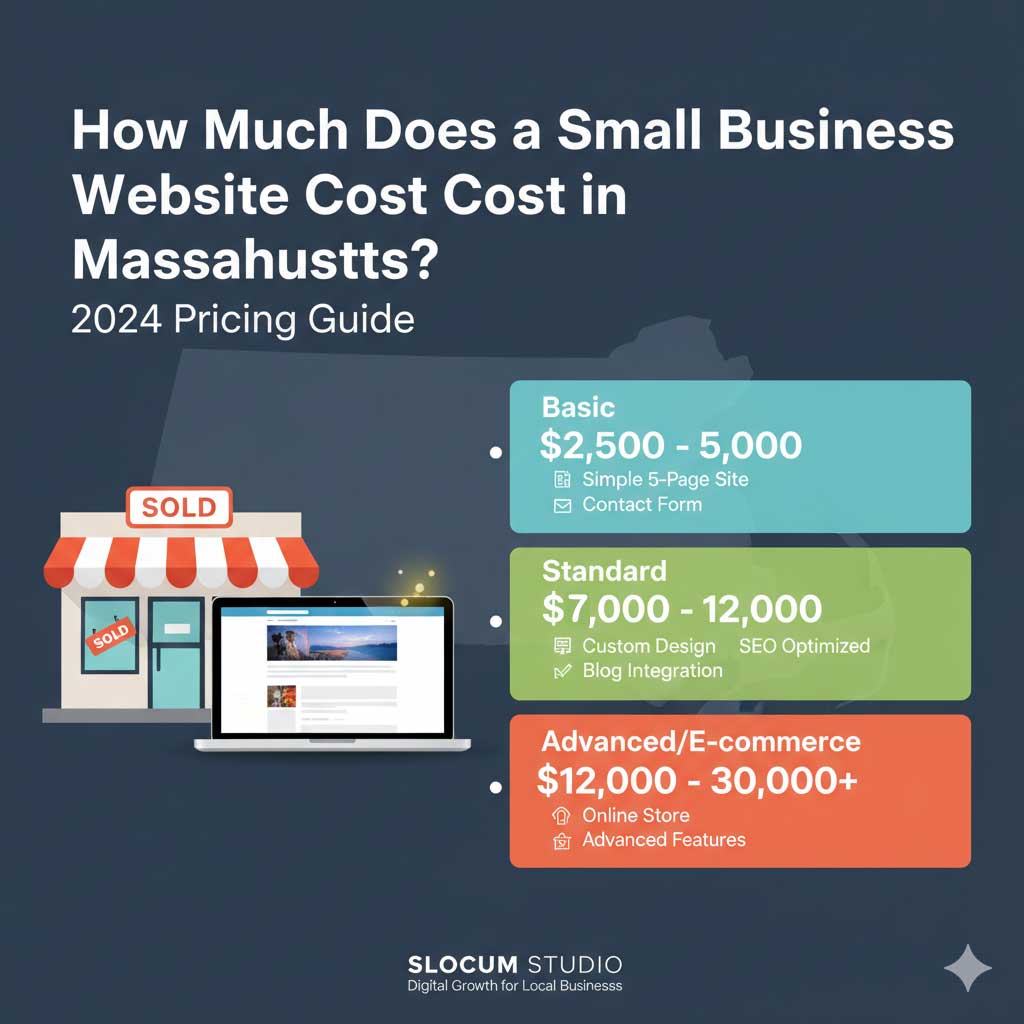Launching or rebuilding a small business website in Massachusetts isn’t a one-size-fits-all purchase. Costs vary depending on the scope, complexity, performance targets, compliance requirements, and ongoing growth plans. Below is a clear, Massachusetts-focused guide that breaks down real-world price ranges, what you should expect at each tier, and how to protect ROI long after launch.
We’re ruling out DIY and fully AI-generated sites up front. A page you can “spin up in 10 minutes for $500” won’t meet real-world requirements: it won’t be architected around buyer journeys, conversion copy, and accessibility (WCAG); it won’t be engineered to hit Core Web Vitals consistently; and it won’t include the unglamorous work that drives growth—information architecture, schema/technical SEO, internal linking, GBP/local signals, tracking & attribution, and privacy/security.
Professional builds plans and tests for edge cases, including multi-device performance budgets, compressed and responsive media, script control, form/booking logic, e-commerce tax & shipping rules, 301 migration maps, canonicalization, error states, and QA across browsers.
They establish an editor-friendly component library so content can scale without breaking the design, and they include governance (roles, SOPs, backups, updates, WAF, uptime/CDN) so the site stays fast and safe under load. Cheap templates and AI one-clicks skip these steps, which is why they leak users, data, and trust—and stall in search.
If the goal is to sustain traffic and generate qualified leads in a competitive Massachusetts market, invest in a site that’s planned, optimized, and supported—not a shortcut that looks fine on launch day but underdelivers for the rest of the year.
What Actually Drives Cost (and Why It Matters in MA)
Several factors push a project higher or lower on the price curve:
- Project scope & page count: A 6-page brochure site costs less than a 40-page multi-location build.
- Design approach: Custom UX/UI (style tiles, component libraries, accessibility patterns) costs more than light theme skinning—but converts better and ages slower.
- Functionality & integrations: Online booking, forms with conditional logic, membership areas, portals, CRM/ERP connections, product catalogs, quoting, donations—each adds design, dev, QA, and security scope.
- E-commerce complexity: Payment methods, shipping logic, tax rules, variants/attributes, bundling, subscriptions—each layer affects timeline and budget.
- Performance & Core Web Vitals: Achieving LCP ≤ 2.5s, INP < 200ms, CLS ≤ 0.1 usually requires image strategy, script control, caching/CDN, and template discipline.
- Compliance & risk: Massachusetts businesses handling resident data should align with 201 CMR 17.00 (data security). Most businesses also benefit from ADA/WCAG-aware patterns to reduce legal exposure and widen audiences.
- Content readiness: If copywriting, photography, and video are not ready, plan time/budget to create them—content is where many projects stall.
- Governance & training: Teams need editor permissions, SOPs, and training to keep content fresh without breaking design.
Timeline certainty: Rush schedules increase costs because they compress discovery, approvals, and QA windows.

Are you interested in maximizing your online growth? We can help you
with conversion rate optimization, Web Design, SEO, and Content Writing. email Call: (857)400-8959
What Should Be Included (So You’re Not Paying Twice)
A strong Massachusetts build plan typically includes:
- Discovery & Strategy: Goals, audiences, competitors, key journeys, IA and wireframes, measurement plan. Here at Slocum Design Studio, we take our time with this process. Clearly understanding our clients’ vision and goals is critical in shaping a website and a marketing plan that works.
- Design System: Responsive grids, typography scale, color tokens, button states, forms, error messages, and reusable sections to keep editors “on-brand.”
- Development: Clean, accessible, semantic templates; custom blocks/components; integration hooks; staging environment.
- Performance Engineering: Image handling (responsive sets/WebP/AVIF), critical CSS, deferred JS, caching/CDN, and Core Web Vitals guardrails.
- SEO Foundations: Crawlable architecture, metadata, headings, internal linking, schema, redirects/canonicals, XML sitemaps.
- Content Support: Copy edits or net-new writing, on-brand microcopy for CTAs/forms, content migration/QC.
- Security & Compliance: Updates, role permissions, 2FA, backups, WAF, privacy notices; 201 CMR 17.00 awareness; accessibility patterns.
- Analytics & Reporting: GA4 configuration, event tracking, lead-source attribution, dashboards, and goal alerts.
- Training & Handover: Editor walkthroughs, update SOPs, emergency playbook, post-launch support window.
Ongoing Costs to Budget (Post-Launch Reality in MA)
- Managed hosting/platform: $25 – $150+ per month depending on resources, staging, and CDN.
- Maintenance, security & updates: $130 – $1,500+ per month (core/plugin updates, uptime, backups, fix tickets, small enhancements).
- SEO & content ops: $800 – $4,000+/mo for research, service + city content, link earning, GBP optimization, review prompts, and technical fixes.
- Paid media & CRO (optional): $1,000 – $10,000+ per month, depending on spend and experiments.
- Photography/video (as needed): Project-based or retainer; critical for conversion-focused pages and local trust.
Massachusetts-Specific Considerations That Influence Cost
- Local Search Footprint: MA businesses often compete across city clusters (e.g., Boston, South Shore, South Coast). Budget for hub-and-spoke content to win “service + city” queries while avoiding thin, duplicate pages.
- Compliance & Risk: If you store or process Massachusetts resident data, align with 201 CMR 17.00 standards in your privacy/infosec posture.
- Accessibility as a Business Advantage: WCAG-aligned components reduce legal risk and expand your market—especially for public-facing organizations.
- Speed Expectations: Northeast traffic patterns + mobile usage demand fast first impressions—slow sites leak leads.
- Seasonality: Many MA sectors (marine, construction, tourism) need campaign pages and landing-page sprints—plan budget for seasonal pushes, not just steady-state updates. Important for small business website cost Massachusetts.

How to Reduce Cost Without Killing Outcomes
- Prioritize MVP: Launch phase 1 with essential journeys (top services, conversion pages, trust content), then iterate with data.
- Use a curated component library: Pre-approved blocks keep design tight while letting editors build new pages rapidly.
- Centralize assets & guidelines: A shared brand kit, media library, and writing guide prevents rewrites and keeps tone consistent.
- Automate basics: Form notifications, lead routing, schema templates, image compression, and backups should not be manual.
Three Massachusetts Website Project Scenarios
Massachusetts website pricing benchmarks shown below are directional ranges tied to scope and deliverables; final quotes follow discovery and documented requirements. (*See footnote below)
- Local Trades (South Shore) – Booking & Reviews
Scope: 10–15 pages, city “spokes,” online booking, review embeds (e.g., Google, Yelp, Facebook, Clutch, Trustpilot), GBP (Google Business Profile) sync, performance budget.
Estimate: $12,000 – $22,000 + $900 – $2,000/mo for SEO/content & maintenance. - Professional Services (Greater Boston) – Lead Gen Engine
Scope: Custom UX, 20–30 pages, calculator/lead magnet, gated resources, CRM integration, Core Web Vitals KPIs.
Estimate: $18,000 – $40,000 + $1,500 – $4,000/mo for SEO/CRO & support. - E-commerce (Statewide) – Catalog & Subscriptions
Scope: 100–400 SKUs, filters, bundles, subscription logic, tax/shipping integrations, A/B testing, performance SLA.
Estimate: $35,000 – $75,000+ + $2,000 – $6,000/mo for SEO, CRO, and maintenance.

Slocum’s Pricing Model
- Clearly understand your investment with Slocum Design Studio’s transparent pricing for custom website solutions.
- Whether you need a foundational brochure site or a dynamic e-commerce platform, we craft digital experiences tailored to your business goals.
- Discover our starting prices and explore how we can help you establish a powerful online presence tailored to your growth.
RFP Checklist to Get an Accurate Quote in MA
Business goals & KPIs (anchored to small business website cost Massachusetts):
Define 1–3 primary outcomes with hard targets and dates (e.g., +35% qualified leads in 90 days, AOV $120 → $150 by Q3). Tie each KPI to trackable events in GA4/CRM and set weekly guardrails (traffic quality, conversion rate, cost per lead) so you can course-correct fast. Quantifying goals at this level ensures your investment aligns with outcomes—not just spend.
Primary audiences & top tasks: Who visits and what they must accomplish in 1–2 clicks.
Document 2–4 audience segments and list their top tasks (e.g., “Get a quote,” “Book a demo,” “Find SDS sheets”). Design navigation and hero CTAs so each task is 1–2 clicks from entry; anything slower gets redesigned.
Content plan: Which pages are net-new vs. migrated; who writes; tone and approvals.
Run a content inventory, mark pages keep/merge/kill/new, and assign owners with deadlines. Lock a style guide (tone, reading level, and terminology) and establish a two-step approval path to prevent drafting from stalling.
Feature list: Booking, calculators, gated assets, memberships, catalogs, multilingual, etc.
Split features into MVP (launch) and Phase 2 (60–120 days) with acceptance criteria for each. Prioritize features that directly move KPIs (booking flow, quote form, PDP improvements) before “nice-to-haves.”
Integrations: CRM/ERP, POS, marketing automation, shipping/tax, analytics.
Map systems, data flow, and field mappings up front (lead source, campaign, product, revenue). Specify authentication, webhooks, and error handling; decide what happens when an integration fails so leads/orders aren’t lost.
Compliance needs: 201 CMR 17.00, WCAG level, privacy notices, and cookie consent.
Set WCAG 2.1 AA as a baseline and implement role-based access, encryption in transit, and secure backups. Publish clear privacy/cookie notices and log consent; align data handling with 201 CMR 17.00 requirements.
Performance targets: LCP/INP/CLS expectations, image standards, third-party scripts allowed.
Commit to LCP ≤ 2.5s, INP < 200ms, CLS ≤ 0.1 on real-user data. Enforce an image policy (AVIF/WebP, responsive sizes, lazy-load) and a strict third-party script budget; monitor with RUM dashboards, not just lab tests.
Post-launch ops: Who updates what, training needs, frequency of content releases, SEO cadence.
Create a RACI: who owns content, design, dev, SEO, and approvals. Schedule a publishing cadence (e.g., 2 service updates + 1 case study/month) with monthly technical SEO checks and quarterly conversion audits.
Budget & phasing: Must-have vs. nice-to-have with a timeline—phase work where sensible.
Fund MVP to hit KPIs quickly, reserve a 10–15% contingency, and schedule Phase 2 for features that require data to prioritize. Each phase ships with success criteria, a timeline, and a rollback plan to protect momentum.

Are you interested in maximizing your online growth? We can help you
with conversion rate optimization, Web Design, SEO, and Content Writing. email Call: (857)400-8959
How to Protect ROI After Launch
- Ship monthly improvements: New or improved service pages, city pages, FAQs, and internal links to maintain freshness and authority.
- Measure what matters: Track form starts, submissions, calls, booked appointments, revenue, not just traffic.
- Tune performance: Re-audit Core Web Vitals quarterly—new scripts and media can quietly slow you down.
- Double down on winners: Promote pages that convert; expand related subtopics; build supporting content clusters.
- Keep design flexible: A modular system prevents redesigns every 18 months and lowers total cost of ownership.
Bottom Line
For clarity on small business website cost in Massachusetts, most professional projects for local small businesses fall between $7,000 and $40,000, with simpler brochure builds at the lower end and complex, multi-location or e-commerce sites at the higher end. The metric that matters most isn’t the launch price—it’s your cost to acquire qualified leads and revenue after launch. Treat the website as the core of a growth program, not a one-time brochure. With the proper scope, measurable KPIs, and consistent post-launch work (including content, SEO, performance, and CRO), your site becomes a compounding asset instead of a sunk cost.
*Footnote:
- Local Trades (South Shore) → small-to-mid: 6–10 weeks, 10–15 pages, light integrations, high local SEO emphasis.
- Professional Services (Greater Boston) → mid: 8–14 weeks, 20–30 pages, gated assets, CRM events, stronger CRO.
- E-commerce (Statewide) → upper-mid: 12–20+ weeks, 100–400 SKUs, filters, bundles, subscriptions, tax/shipping, A/B testing, SLA.
Schedule a Discovery Session
"*" indicates required fields


I just wanted to express my gratitude for the valuable insights you provide through your blog. Your expertise shines through in every word, and I’m grateful for the opportunity to learn from you.
Your writing has a way of resonating with me on a deep level. It’s clear that you put a lot of thought and effort into each piece, and it certainly doesn’t go unnoticed.